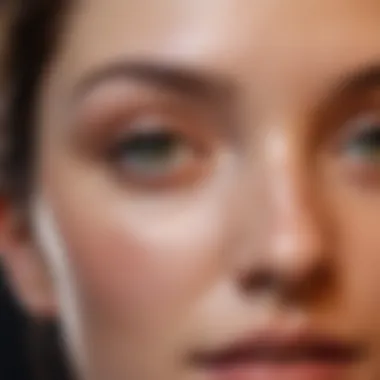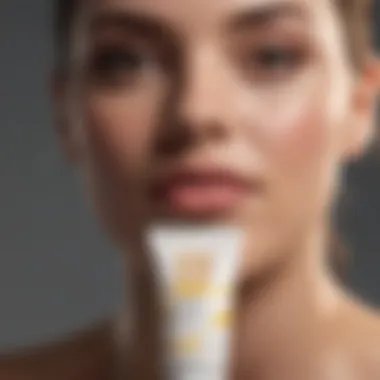Essential Factors to Avoid in Sunscreen Selection: A Guide for Skincare Enthusiasts


Beauty Tips and Tricks
When it comes to sunscreen selection, there are crucial factors that beauty enthusiasts should be aware of to protect their skin optimally. Understanding what to avoid in sunscreen can significantly impact your skincare routine and overall skin health. By recognizing harmful ingredients and navigating through potentially misleading labels, you can ensure a seamless experience in safeguarding your skin from the sun's harmful rays.
Skincare Routine Tips
Choosing the right sunscreen is an integral part of any skincare regimen. By steering clear of certain elements in sunscreen products, you can enhance the effectiveness of your skincare routine. It is essential to be mindful of ingredients that may be harmful to your skin and to decipher the true meaning behind product labels to make informed decisions.
Haircare Hacks
While sunscreen is primarily associated with skin protection, it is also relevant to hair health. Understanding which components to avoid in sunscreen can prevent damage to your hair, such as dryness or breakage. By incorporating sunscreen that is hair-friendly and devoid of harmful substances, you can maintain healthy and well-nourished hair.
Makeup Application Techniques
Sunscreen plays a vital role in preparing the skin for makeup application. Knowing what to avoid in sunscreen can contribute to a smoother makeup application process. By avoiding ingredients that may cause irritation or affect makeup adherence, you can create a flawless makeup look that lasts throughout the day.
Introduction to Sunscreen Selection
In our journey towards understanding the intricacies of effective sun protection, the selection of the right sunscreen plays a crucial role. Sunscreens act as shields against harmful UV rays, safeguarding our skin from potential damage. When it comes to selecting sunscreen products, there are numerous factors to consider. From SPF levels to skin type compatibility, each aspect must be carefully evaluated to ensure optimal protection.
Understanding Sunscreen Labels
Interpreting sunscreen labels can be a daunting task for many consumers. Terms like SPF, broad-spectrum, and water-resistant often leave individuals puzzled about which product best suits their needs. It is essential to decode these labels to make informed decisions. Understanding the significance of SPF levels and the meaning of 'broad-spectrum' can guide users towards selecting the most suitable sunscreen for their skin.
Common Misconceptions About Sunscreen
With a plethora of information available, misconceptions about sunscreen abound in the beauty community. One common fallacy is that sunscreen is only necessary on sunny days. However, UV rays can penetrate clouds, making sunscreen a daily essential. Debunking these myths is crucial for cultivating a skincare routine that prioritizes protection.
Importance of Sun Protection
The importance of sun protection cannot be overstated. Exposure to UV rays can lead to sunburn, premature aging, and even skin cancer. Incorporating sunscreen into our daily skincare regimen acts as a proactive measure against these potential risks. By embracing sun protection habits, individuals can maintain healthy and radiant skin for years to come.


Ingredients to Avoid in Sunscreen
When we talk about the ingredients to avoid in sunscreen, we are delving into a crucial aspect of skincare that is often overlooked. The choice of ingredients in sunscreen can significantly impact not only the effectiveness of the product but also the health of your skin. By focusing on specific elements that may be harmful, we can make more informed decisions about the products we use on our skin. Understanding the benefits and considerations regarding the ingredients to avoid in sunscreen is essential for maintaining a healthy and radiant complexion.
Oxybenzone and Octinoxate
Impact on Coral Reefs:
One significant aspect of oxybenzone and octinoxate is their detrimental effects on coral reefs. Highlighting this specific factor is vital in discussing ingredients to avoid in sunscreen. The impact on coral reefs is a key characteristic that raises concerns about the environmental consequences of using sunscreens containing these ingredients. The unique feature of these chemicals contributing to coral reef destruction emphasizes the importance of choosing reef-safe products for a more sustainable approach to skincare routines.
Potential Hormonal Disruption:
Another aspect to consider is the potential hormonal disruption caused by oxybenzone and octinoxate. This factor plays a crucial role in the decision-making process when selecting sunscreen. Exploring the effects of these chemicals on hormonal balance underscores the significance of avoiding them in skincare products. Understanding the unique feature of hormonal disruption associated with these ingredients is vital for mitigating any risks they may pose to our overall well-being.
Retinyl Palmitate
Increased Skin Sensitivity:
In the realm of skincare, increased skin sensitivity is a critical aspect to address, especially concerning ingredients like retinyl palmitate. The key characteristic of heightened skin sensitivity emphasizes the need to steer clear of this ingredient in sunscreen formulations. Recognizing the unique feature of retinyl palmitate in inducing skin sensitivity underscores the importance of making informed choices to protect our skin from potential irritants.
Risk of Skin Irritation:
Moreover, the risk of skin irritation associated with retinyl palmitate is a significant consideration when discussing ingredients to avoid in sunscreen. Understanding the adverse effects this ingredient may have on skin health highlights the need to be cautious in selecting products with skin-friendly formulations. Exploring the unique feature of skin irritation risk posed by retinyl palmitate underscores the importance of prioritizing gentle ingredients in skincare products.
Parabens
Endocrine Disruption Concerns:
The topic of endocrine disruption concerns linked to parabens is essential in the conversation about harmful sunscreen ingredients. Highlighting the potential impact on our endocrine system sheds light on why avoiding parabens is crucial for overall well-being. Understanding the unique feature of how parabens can disrupt hormonal balance underscores the importance of choosing paraben-free options to safeguard our health.
Allergic Reactions:


Another critical aspect to consider is the potential allergic reactions triggered by parabens in sunscreen. This factor significantly influences our choices when it comes to selecting products for skincare routines. Exploring the key characteristic of potential allergic reactions associated with parabens emphasizes the need to opt for hypoallergenic alternatives. Recognizing the unique feature of allergy risks connected to parabens reinforces the importance of being mindful of ingredient labels in skincare products.
Fragrance
Potential Irritants:
When discussing fragrance as an ingredient to avoid in sunscreen, the focus on potential irritants is paramount for maintaining skin health. Highlighting the key characteristic of fragrance as a common irritant in skincare products brings attention to the importance of choosing unscented or fragrance-free options. Understanding the unique feature of potential irritants linked to fragrance underscores the need for gentler formulations in sunscreen to prevent skin reactions.
Skin Sensitivity Issues:
Moreover, addressing skin sensitivity issues related to fragrance is crucial in the context of selecting sunscreen ingredients wisely. The significant impact of fragrances on skin sensitivity underscores the importance of avoiding them in skincare products. Exploring the key characteristic of how fragrances can exacerbate skin sensitivity highlights the need to prioritize products designed for sensitive skin. Recognizing the unique feature of skin sensitivity issues posed by fragrance emphasizes the importance of opting for fragrance-free alternatives for a safer skincare regimen.
Choosing the Right Sunscreen for Your Skin Type
When it comes to selecting sunscreen tailored to your specific skin type, the stakes are high for maintaining optimal skin health and protection. The process of picking the right sunscreen is a crucial aspect of your skincare routine, as it directly impacts how well your skin is shielded from the harmful effects of UV rays.
With various skin types such as oily, dry, sensitive, and combination skin, the sunscreen you choose should cater to the specific needs and requirements of your skin. Understanding your skin type is fundamental in making an informed decision to ensure maximum sun protection without causing adverse reactions or discomfort.
Considerations like SPF levels, formulation (physical or chemical), and additional features like water resistance play a pivotal role in determining the ideal sunscreen for your skin. For instance, individuals with oily skin might benefit from oil-free or mattifying sunscreens, while those with dry skin could opt for moisturizing formulations to prevent further dryness.
By delving into the nuances of different sunscreen options and how they align with your skin type, you equip yourself with the knowledge needed to make a conscious choice that is both protective and beneficial for your skin's well-being.
SPF Levels and UV Protection
The Sun Protection Factor (SPF) level of a sunscreen is a critical factor to consider when selecting a product that effectively shields your skin from the sun's harmful UV rays. SPF indicates the level of protection a sunscreen offers against UVB rays, which are primarily responsible for causing sunburn and skin damage.
Understanding the SPF levels helps in choosing a sunscreen that provides adequate protection based on factors like your skin type, sun exposure duration, and outdoor activities. It is recommended to opt for a broad-spectrum sunscreen with an SPF of 30 or higher for comprehensive protection against both UVA and UVB rays.
Higher SPF values do not necessarily translate to significantly increased protection, but rather indicate extended protection against UVB rays. Consistent reapplication of sunscreen every two hours, especially when outdoors, ensures continuous shield against sun damage and helps maintain healthy skin.
Selecting a sunscreen with the right SPF level tailored to your skin type and sun exposure habits is a proactive approach towards safeguarding your skin against sunburns, premature aging, and potential skin cancers.


Broad-Spectrum Coverage
Broad-spectrum sunscreen provides protection against both UVA and UVB rays, offering comprehensive coverage against the full range of damaging sun rays. UVA rays are associated with aging effects like wrinkles and premature aging, while UVB rays are responsible for sunburn.
Choosing a sunscreen labeled as broad-spectrum ensures that your skin is shielded from the harmful effects of both types of ultraviolet rays, minimizing the risk of skin damage and maintaining healthy skin appearance. This comprehensive protection helps in preserving skin quality, reducing the chances of photoaging, and safeguarding against skin cancer development.
By opting for broad-spectrum coverage, you prioritize holistic sun protection that addresses different sun damage aspects, preserving your skin's health and appearance in the long run.
Physical vs. Chemical Sunscreens
Physical and chemical sunscreens differ in their mode of action and formulation, catering to various preferences and skin sensitivities. Physical sunscreens, also known as mineral sunscreens, contain active mineral ingredients like zinc oxide or titanium dioxide that create a physical barrier on the skin surface, reflecting and scattering UV rays.
On the other hand, chemical sunscreens contain organic compounds that absorb UV radiation, converting it into heat and releasing it from the skin. Each type of sunscreen offers unique advantages, such as physical sunscreens being less likely to cause skin irritation and ideal for sensitive skin types, while chemical sunscreens usually provide a lighter, more comfortable feel on the skin.
Considering factors like skin sensitivity, potential allergies, and personal preferences, selecting between physical and chemical sunscreens is a personal choice that should align with your skin's needs and comfort. By understanding the differences between these types of sunscreens, you can make an informed decision that optimally protects your skin while ensuring a pleasant wearing experience.
Tips for Effective Sunscreen Application
In the realm of skincare and protection from harmful UV rays, mastering the art of proper sunscreen application is paramount. The efficacy of sunscreen hinges on how well it is applied, making this topic a crucial focal point in our comprehensive guide for beauty enthusiasts. By understanding the nuances of applying sunscreen correctly, individuals can optimize sun protection and safeguard their skin from damage effectively. The discussion around Tips for Effective Sunscreen Application will unveil the intricacies of this process, shedding light on key elements that influence the product's performance and its benefits for skin health.
Applying Adequate Amounts
One of the fundamental aspects of effective sunscreen application is ensuring that an adequate amount of the product is applied to the skin. This subsection delves into the importance of using the right quantity of sunscreen to achieve the desired level of protection. By elaborating on the significance of applying an even layer across all exposed areas, individuals can grasp the significance of quantity in maximizing sun protection. Moreover, insights will be shared regarding how insufficient application may compromise the SPF level declared on the product, emphasizing the critical role of quantity in sunscreen efficacy.
Reapplication Frequency
The frequency of sunscreen reapplication is a key consideration in maintaining continuous protection against UV radiation. Exploring this aspect within our guide sheds light on the reasons why reapplication is necessary for prolonged sun exposure. Readers will gain a deeper understanding of how factors like sweat, water exposure, and sun exposure duration affect the need for regular reapplication. By emphasizing the correlation between reapplication frequency and sustained sun protection, individuals will be equipped with essential knowledge to shield their skin effectively throughout the day.
Sun Protection Beyond Sunscreen
While sunscreen is a vital component of sun protection, exploring supplementary methods to shield the skin from UV damage is equally crucial. This section delves into alternative strategies and products that can complement the protective effects of sunscreen. By elucidating on the benefits of wearing protective clothing, seeking shade, and employing accessories like hats and sunglasses, readers will uncover a holistic approach to sun protection beyond sunscreen. Understanding the multifaceted nature of sun protection empowers individuals to develop a comprehensive defense strategy that prioritizes skin health and safety in various outdoor settings.
Conclusion
In the realm of skincare and beauty, the significance of concluding remarks cannot be overstated. As we navigate through the intricate world of sun protection products, it becomes imperatively crucial to reflect upon the core principles illuminated within this comprehensive guide. The essence of this conclusion lies in amalgamating the intricate details discussed throughout the various sections of this article, emphasizing the crucial importance of meticulous sunscreen selection and application routines. By synthesizing the dos and don'ts of sunscreen choices, we equip ourselves with the knowledge required to shield our skin from the sun's harsh rays effectively. Prioritizing skin health and safety through informed choices resonates as the central theme, underscoring the critical role played by educated decisions in nurturing and safeguarding our skin.
Prioritizing Skin Health and Safety
Delving into the domain of skincare, the concept of skin health and safety assumes paramount importance. For beauty enthusiasts and skincare aficionados alike, the meticulous attention directed towards prioritizing the well-being of our skin serves as the guiding principle. Within the realm of sunscreen selection, the emphasis on avoiding harmful ingredients extends beyond mere aesthetic concerns to holistic health considerations. Understanding the adverse effects of compounds like oxybenzone, octinoxate, retinyl palmitate, parabens, and fragrances becomes pivotal in curating a skincare regimen that aligns with the ethos of safeguarding skin vitality. By actively steering clear of these detrimental components, individuals not only protect their skin from potential harm but also contribute towards environmental conservation and personal health preservation. As we navigate through the multitude of sunscreen options available in the market, the vigilance in evaluating product labels and ingredients emerges as a cornerstone in our quest for effective sun protection. By cognizantly prioritizing skin health and safety through informed product choices, we herald a new era of conscientious skincare practices that celebrate nourishment, protection, and vitality in equal measure.







